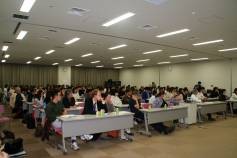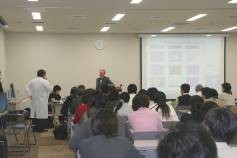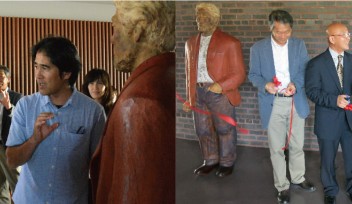Lecture on ADHD by Dr. Sergeant
Lecture on ADHD by Dr. Sergeant
Dr. Joseph Sergeant, Professor in the Department of Clinical Neuropsychology at the Free University (Vrije Universiteit) in Amsterdam, presented a lecture on February 7 at the Okinawa Prefectural Nanbu Medical Center and Children’s Medical Center in Haebaru Town. Dr. Sergeant is a leading authority on Attention Deficit Hyperactivity Disorder (ADHD), the primary research focus of the Human Developmental Neurobiology Unit at OIST, lead by Dr. Gail Tripp. The lecture, focusing on the validity and treatment of ADHD, was jointly hosted by the Nanbu Medical Centers and OIST.
Attention Deficit Hyperactivity Disorder (ADHD) is a disorder characterized by symptoms of inattention, overactivity, and impulsivity. Many researchers now believe that ADHD has a neurobiological basis. Some professionals question the existence of this highly-researched disorder, arguing that children display some degree of inattentiveness, overactivity, and impulsiveness. Offering an accessible and thorough overview of the existing research into the nature and treatment of ADHD, Dr. Sergeant stressed that ADHD is a developmental disorder that is not simply outgrown, and the symptoms of this disorder continue to negatively impact those diagnosed into adolescence and beyond. Dr. Sergeant presented strong empirical evidence for the validity of this disorder. Dr. Sergeant also presented on overview of available research on the contribution of genes to the development of ADHD, noting that the interplay of several genes and environmental factors is likely to lead to the expression of the disorder symptoms. Dr. Sergeant and colleagues have recently completed data collection from 1,500 children and their families in Europe. These researchers believe much about the genetics of ADHD will be revealed by this study. At the end of the lecture, Dr. Sergeant emphasized the importance of the study of the cerebellum, the basal ganglia and prefrontal cortex to understanding of ADHD. He concluded that specifying gene loci, associated with ADHD, may enable us to clarify diagnostic criteria for ADHD and treat those who have ADHD more effectively in the near future.

About 200 people including hospital staff filled the lecture hall

Dr. Tripp (center) of the Human Developmental Neurobiology Unit asks a question

Dr. Sergeant takes a question from one of the hospital staff

Dr. Joseph Sergeant |
| Born in Scotland in 1945. After receiving his Ph.D. at the University of Groningen in the Netherlands in 1981, Dr. Sergeant held academic positions at the University of Groningen as well as at the University of Amsterdam. Since joining in 1999, Dr. Sergeant has headed the Free University’s Department of Clinical Neuropsychology. He has chaired and coordinated the European Network on Hyperkinetic Disorders (Eunethydis) since its foundation in 1990. Dr. Sergeant has also served on the editorial board of The Journal of Abnormal Child Psychology since 1988 and was a member of the editorial board of The Journal of Child Psychology and Psychiatry for 10 years. His research career has concentrated on identifying the specific information-processing deficits of hyperactive children. A current focus of this research is on psychopharmacology and its effects on executive processing in children with ADHD. |
For press enquiries:
Press Inquiry Form













